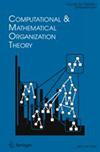The Legitimacy of Sustainability Standards: A Paradox Perspective
IF 1.5
4区 管理学
Q3 COMPUTER SCIENCE, INTERDISCIPLINARY APPLICATIONS
Computational and Mathematical Organization Theory
Pub Date : 2021-07-26
DOI:10.1177/26317877211049493
引用次数: 21
Abstract
Sustainability standards have proliferated widely in recent years but their legitimacy remains contested. This paper suggests that sustainability standards need to cope with an important but unexplored paradox to gain legitimacy. While standard setters create low entry barriers and requirements for adopters so that standards can diffuse quickly and achieve a status of cognitive legitimacy, standards also need to ensure that adopters create high levels of impact, thereby acquiring moral legitimacy. While the need for diffusion and impact occurs at the same time, they cannot be achieved simultaneously. We unpack this paradox and show that its salience for standard setters differs depending on (a) the growth trajectory of a standard and (b) the perceived intensity of the demands for diffusion and impact. We outline five response strategies that standard setters can use to tackle the diffusion–impact paradox and illustrate our theoretical considerations through a detailed case study of the UN Global Compact. Our paper advances scholarly understandings on how sustainability standards gain legitimacy and sheds light on the complex and inherently paradoxical nature of legitimacy. We derive implications for the literatures on sustainability standards, legitimacy, and paradox management.可持续性标准的合法性:一个悖论的视角
近年来,可持续性标准得到了广泛推广,但其合法性仍存在争议。本文认为,可持续发展标准需要处理一个重要但尚未被探索的悖论,以获得合法性。虽然标准制定者为采用者创造了较低的进入门槛和要求,以便标准能够迅速传播并获得认知合法性的地位,但标准还需要确保采用者创造高水平的影响,从而获得道德合法性。虽然传播和影响的需要是同时发生的,但它们不可能同时实现。我们解开了这个悖论,并表明它对标准制定者的显著性取决于(a)标准的增长轨迹和(b)对扩散和影响需求的感知强度。我们概述了标准制定者可以用来解决扩散-影响悖论的五种应对策略,并通过对联合国全球契约的详细案例研究说明了我们的理论考虑。我们的论文推进了对可持续性标准如何获得合法性的学术理解,并揭示了合法性的复杂和内在矛盾的本质。我们对可持续性标准、合法性和悖论管理的文献提出了启示。
本文章由计算机程序翻译,如有差异,请以英文原文为准。
求助全文
约1分钟内获得全文
求助全文
来源期刊

Computational and Mathematical Organization Theory
COMPUTER SCIENCE, INTERDISCIPLINARY APPLICATIONS-MATHEMATICS, INTERDISCIPLINARY APPLICATIONS
CiteScore
3.80
自引率
16.70%
发文量
14
审稿时长
>12 weeks
期刊介绍:
Computational and Mathematical Organization Theory provides an international forum for interdisciplinary research that combines computation, organizations and society. The goal is to advance the state of science in formal reasoning, analysis, and system building drawing on and encouraging advances in areas at the confluence of social networks, artificial intelligence, complexity, machine learning, sociology, business, political science, economics, and operations research. The papers in this journal will lead to the development of newtheories that explain and predict the behaviour of complex adaptive systems, new computational models and technologies that are responsible to society, business, policy, and law, new methods for integrating data, computational models, analysis and visualization techniques.
Various types of papers and underlying research are welcome. Papers presenting, validating, or applying models and/or computational techniques, new algorithms, dynamic metrics for networks and complex systems and papers comparing, contrasting and docking computational models are strongly encouraged. Both applied and theoretical work is strongly encouraged. The editors encourage theoretical research on fundamental principles of social behaviour such as coordination, cooperation, evolution, and destabilization. The editors encourage applied research representing actual organizational or policy problems that can be addressed using computational tools. Work related to fundamental concepts, corporate, military or intelligence issues are welcome.
 求助内容:
求助内容: 应助结果提醒方式:
应助结果提醒方式:


